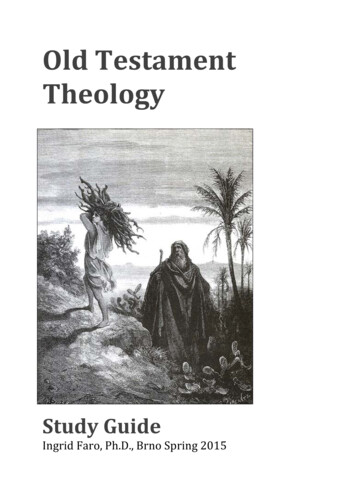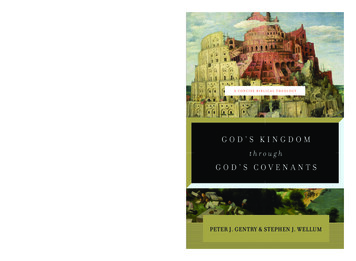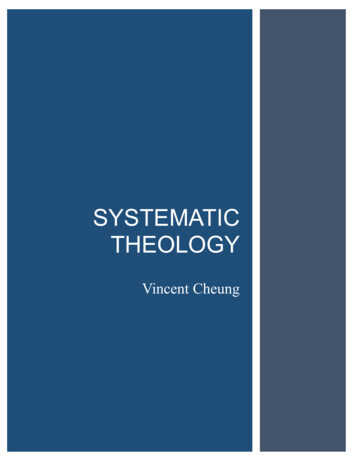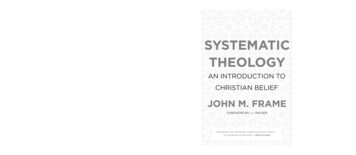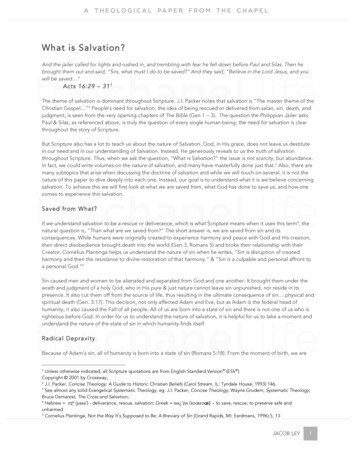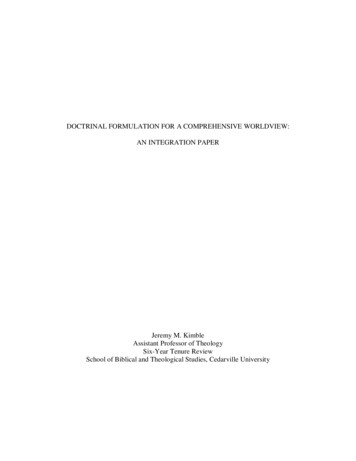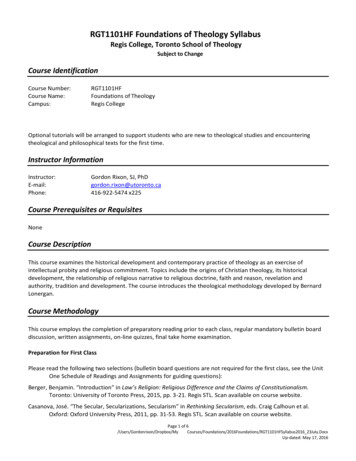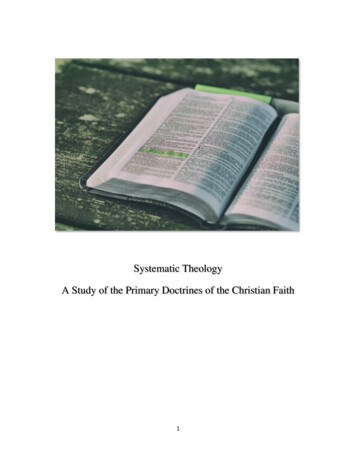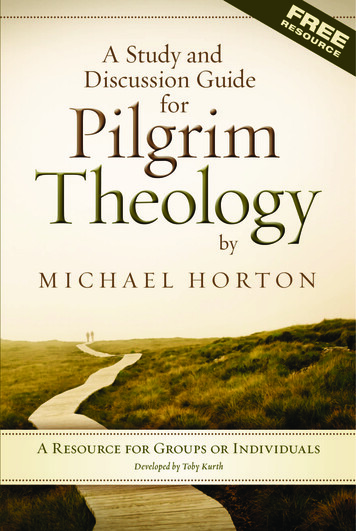
Transcription
A Study andDiscussion GuideforPilgrimTheologybyMICHAEL HORTONTOBY KURTH9780310515197 pilgrim theology study guide.indd 111/28/12 3:47 PM
ZONDERVANA Study and Discussion Guide for Pilgrim Theology by Michael HortonCopyright 2013 by Michael HortonRequests for information should be addressed to:Zondervan, Grand Rapids, Michigan 49530ISBN 978-0-310-51519-7All Scripture quotations, unless otherwise indicated, are taken from The Holy Bible, EnglishStandard Version, copyright 2001 by Crossway Bibles, a division of Good News Publishers. Used by permission. All rights reserved.Any Internet addresses (websites, blogs, etc.) and telephone numbers in this book areoffered as a resource. They are not intended in any way to be or imply an endorsement byZondervan, nor does Zondervan vouch for the content of these sites and numbers for thelife of this book.All rights reserved. No part of this publication may be reproduced, stored in a retrievalsystem, or transmitted in any form or by any means — electronic, mechanical, photocopy,recording, or any other — except for brief quotations in printed reviews, without the priorpermission of the publisher.Cover design: Ron HuizingaCover photography: iStockphotoInterior design: Matthew Van ZomerenPrinted in the United States of America9780310515197 pilgrim theology study guide.indd 211/28/12 3:47 PM
18.19.A “Pilgrim” Theology? . . . . . . . . . . . . . . . . . . . . . . . . . . . . . .5Knowing God . . . . . . . . . . . . . . . . . . . . . . . . . . . . . . . . . . .God’s Written Word . . . . . . . . . . . . . . . . . . . . . . . . . . . . . .The Living God . . . . . . . . . . . . . . . . . . . . . . . . . . . . . . . . .The Holy Trinity . . . . . . . . . . . . . . . . . . . . . . . . . . . . . . . . .Creation and Human Personhood . . . . . . . . . . . . . . . . . . . .The Fall. . . . . . . . . . . . . . . . . . . . . . . . . . . . . . . . . . . . . . . .Jesus Christ: The Lord Who Is Servant . . . . . . . . . . . . . . . .The Work of Christ . . . . . . . . . . . . . . . . . . . . . . . . . . . . . . .The Spirit and the Kingdom . . . . . . . . . . . . . . . . . . . . . . . .Chosen and Called . . . . . . . . . . . . . . . . . . . . . . . . . . . . . . .Union with Christ . . . . . . . . . . . . . . . . . . . . . . . . . . . . . . . .Justified and Adopted . . . . . . . . . . . . . . . . . . . . . . . . . . . . .Sanctification and Perseverance . . . . . . . . . . . . . . . . . . . . . .The Doctrine of Glorification . . . . . . . . . . . . . . . . . . . . . . .Word and Sacraments . . . . . . . . . . . . . . . . . . . . . . . . . . . . .Baptism and the Supper . . . . . . . . . . . . . . . . . . . . . . . . . . .The Church. . . . . . . . . . . . . . . . . . . . . . . . . . . . . . . . . . . . .The End Times . . . . . . . . . . . . . . . . . . . . . . . . . . . . . . . . . .The Resurrection of the Body and the Life Everlasting . . . 7 pilgrim theology study guide.indd 311/28/12 3:47 PM
9780310515197 pilgrim theology study guide.indd 411/28/12 3:47 PM
A “Pilgrim” Theology?Pilgrim” theology is the relentless pursuit of reality. This journey ofunderstanding must begin with the central claim of all Scripture,which is the gospel — the good news of Jesus Christ. The gospel doesnot just tell us that God exists. The gospel tells us what God is like,how he has acted in history, and where we stand in relationship to him.As Michael Horton contends in the introduction to Pilgrim Theology,“I do not believe the gospel because I believe in God; rather, I believe inGod because of the gospel. There are great arguments for the existenceof a supreme being, but unless the gospel is true, the claim that a godexists is either personally meaningless or a horrible threat” (PT, 20).*Theology drives us to believe in the particular God who is revealedin the Scripture and is known in Jesus Christ. Studying theology isnot simply a pursuit of information; rather, it is a pursuit of radicaltransformation.We come to the Bible primarily to learn about God; in the process,we learn about ourselves and our world. The Bible is a story about Godand how he has revealed himself to humanity. It is an unfolding dramaof redemption that gives us the true meaning of history. Pilgrim Theologyis designed to help guide us on our journey of discovery by helping us “tograsp that the Bible is not chiefly about me and my personal experienceor morality. Rather, it is the revelation of God and God’s history withus” (PT, 20). As you work through Pilgrim Theology, you will see howthe Bible keeps you firmly planted in reality and engaged with God, whograciously reveals himself to us.Theology should connect to practical living. The Bible does not settruth and experience and our head and our heart against each other.Pilgrim Theology and this Study Guide are both written to help us integrate our faith and practice, what we know and what we do. “Theologyis the lived, social, and embodied integration of drama, doctrine, dox-“* The abbreviation PT refers to Michael Horton, Pilgrim Theology: Core Doctrines for ChristianDisciples (Grand Rapids: Zondervan, 2012), and TCF is the abbreviation of Michael Horton, TheChristian Faith: A Systematic Theology for Pilgrims on the Way (Grand Rapids: Zondervan, 2011).9780310515197 pilgrim theology study guide.indd 511/28/12 3:47 PM
6 s Study and Discussion Guide for Pilgrim Theologyology, and discipleship” (TCF, 70). This Study Guide will use Drama,Doctrine, Doxology, and Discipleship like the four coordinates ofa compass to guide us on our journey to know God. The discussion/reflection questions in this Study Guide will be organized under theseheadings. A brief description of each of these headings is provided below.Drama (“Big Story”)All of our faith and practice arise out of the drama of Scripture, the“big story” that traces the plot of history from creation to consummation, with Christ as its Alpha and Omega, the beginning and the end.Everything we learn about God and the Bible is situated somewherealong the line of this unfolding drama. As we work through differenttheological concepts, we must keep an eye on where and how they fitinto the big story.Doctrine (“What We Believe”)What we believe about God, ourselves, and our world directly emergesfrom God’s unfolding drama of redemption. “From what God does inhistory we are taught certain things about who he is and what it meansto be created in his image, fallen, and redeemed, renewed, and glorifiedin union with Christ. As the Father creates his church, in his Son andby his Spirit, we come to realize what this covenant community is andwhat it means to belong to it; what kind of future is promised to us inChrist; and how we are to live here and now in the light of it all” (PT,16). The Study Guide questions focused on doctrine will help us betterunderstand the key terms and distinctions in each chapter.Doxology (“Praise and Worship”)Drama and doctrine together with God’s Spirit produce doxology.“When the doctrine is understood in the context of its dramatic narrative, we find ourselves dumbfounded by God’s grace in Jesus Christ,surrendering to doxology (praise)” (TCF, 22). We stand amazed beforeGod, desiring to surrender our lives to him. We are captivated and humbled by God’s truth and self-revelation to us in Christ. Doxology is notjust about Sunday worship; it transforms all of life. The Study Guidequestions focused on doxology are designed to help engage our heartswith what we learned in the chapter.9780310515197 pilgrim theology study guide.indd 611/28/12 3:47 PM
A “Pilgrim” Theology? s 7Discipleship (“Reshaped Lives”)God uses drama, doctrine, and doxology to produce disciples. “Ourminds transformed by God’s Word so that we are grateful captives ofpraise to God, we become reshaped in Christ’s image as new charactersin his drama” (TCF, 23). God adds us to his covenant community andteaches us how to live in this world as disciples of Christ. Theologyshould always be done for and by the church to serve God’s unfoldingdrama of redemption. We are each called to live in Christ, together withhis church, so that the world may believe he was sent (John 17:21). TheseStudy Guide questions will focus on how to translate what we are learning into how we are living.9780310515197 pilgrim theology study guide.indd 711/28/12 3:47 PM
Chapter OneKnowing GodTheology begins with God’s self-revelation. Everything we knowabout God first came from God. This means we only know thingsabout him because he first taught them to us. We do not know God “ashe is” in himself; we know him as he acts in history, as he has chosen tointroduce himself to us. As Michael Horton explains, coming to “know”God is like meeting a stranger who has come to rescue us from the danger we did not even realize existed. This chapter explains how we knowwhat we know about God as well as how God reveals himself to us in thegospel — namely, through the illumination of the Spirit in the writtenWord of God and consummately in Jesus Christ. God’s self-revelationcorrects our distorted view of him, of ourselves, and of our world.Key TermsPT: 28 – 29TCF: 36 – 39Polytheism: Belief in many gods.PT: 28 – 29TCF: 36 – 39Pantheism: All is divine.PT: 28 – 29TCF: 36 – 39Panentheism: All is within divinity; the divine andworldly principles are mutually dependent.PT: 28 – 29TCF: 39 – 41Deism: God created the world but does not intervenemiraculously within it.9780310515197 pilgrim theology study guide.indd 811/28/12 3:47 PM
Knowing God s 9PT: 28 – 29TCF: 39 – 41Atheism: God does not exist.PT: 30TCF: 47 – 57,126 – 29Accommodation: We know things as God has revealedthem to us, accommodating his knowledge to our feeblecapacity to understand.Key DistinctionsPT: 30, 35TCF: 47 – 79Transcendence/Immanence: God is entirely aboveand outside of creation (transcendent) as well as entirelywithin creation (immanent). He is incomprehensible inhis majesty, but in his condescending goodness and love,he freely relates us to himself.PT: 33 – 34TCF: 47 – 79Archetypal/Ectypal: Archetypal knowledge is theknowledge that only God possesses. It is the original,whereas all else is the copy (ectypal knowledge), alwaysimperfect, incomplete, and dependent on God’s perfectknowledge.PT: 34 – 35TCF: 54 – 57,126 – 29Analogical/Univocal/Equivocal: Analogical knowledge holds that creaturely knowledge is a copy ofdivine knowledge, whereas univocal knowledge viewsthe knowledge of God and creatures as identical, andequivocal knowledge holds that God’s knowledge andcreaturely knowledge have nothing in common.PT: 37 – 39TCF: 135 – 39Law/Gospel: In the widest sense, the law is everythingin Scripture that commands, and the gospel is everything in Scripture that makes promises based solely onGod’s grace to us in Christ.PT: 37 – 41TCF: 139 – 50General/Special Revelation: Creation (general revelation) displays the existence, wisdom, power, goodness,and righteousness of God “so that everyone is withoutexcuse” (Rom 1:20). However, in special revelation Godmore clearly discloses these attributes, correcting oursinful distortions, and also reveals the gospel of his Son,which is not known apart from this source.9780310515197 pilgrim theology study guide.indd 911/28/12 3:47 PM
10 s Study and Discussion Guide for Pilgrim TheologyDiscussion/Reflection QuestionsDrama (“Big Story”)1. Why does our ability to know God depend on his acts of creation,providence, and redemption in history? (PT: 31 – 32)Doctrines (“What We Believe”)1. Which of the different theories of knowledge do you see in yourculture (atheism, deism, panentheism, pantheism, polytheism)? How does each of them contradict the way God hasrevealed himself in history? (PT: 28 – 29)2. Why is accommodation necessary for us to know God? (PT: 31)3. How has God displayed his transcendence in history? How hasGod displayed his immanence? (PT: 30, 35)4. How does God’s knowledge (archetypal) relate to our knowledge (ectypal)? How can we as limited human beings know Godtruthfully? (PT: 33 – 34)5. Compare and contrast an analogical knowledge of God with aunivocal or equivocal knowledge of God. (PT: 34 – 35)6. Why are God’s works in creation and providence described asgeneral revelation? (PT: 37 – 41)7. How does God use the law and the gospel to relate to his people?(PT: 37 – 39)8. How does special revelation relate to general revelation? (PT:40 – 41)Doxology (“Praise and Worship”)1. How does understanding the way you know God help you totrust him? (PT: 31)2. How should God’s transcendence and immanence guide the waythat we worship him? (PT: 30 – 35)3. Why is God the only proper object of our worship? What aresome things that compete for your worship? (PT: 43)4. How do the historical facts and the doctrine of the resurrectionproduce repentance and trust in you? (PT: 49)9780310515197 pilgrim theology study guide.indd 1011/28/12 3:47 PM
Knowing God s 11Discipleship (“Reshaped Lives”)1. Describe some of the ways that understanding the “big story” ofGod’s unfolding drama of redemption changes and challenges theway you live?2. How does the third use of the law help a believer to follow Christ?(PT: 39)3. Why is it important to understand that the resurrection of JesusChrist is grounded in history? (PT: 44 – 49)4. How do drama, doctrine, and doxology lead to discipleship?(PT: 49)Further ReadingHorton, Michael S. The Christian Faith: A Systematic Theology forPilgrims on the Way.Chapter 1: Dissonant Dramas: Paradigms for Knowing God andthe World, 35 – 79.Chapter 2: The Character of Theology: A Theoretical or a Practical Science? 80 – 112.Chapter 3: The Source of Theology: Revelation, 113 – 50.Carson, D. A., and John Woodbridge. Scripture and Truth. DownersGrove, IL: InterVarsity Press, 1992. Intermediate.Packer, J. I. Knowing God. Downers Grove, IL: InterVarsity Press,1979. Beginner.Vanhoozer, Kevin. The Drama of Doctrine. Louisville: WestminsterJohn Knox, 2005. Advanced.9780310515197 pilgrim theology study guide.indd 1111/28/12 3:47 PM
Chapter TwoGod’s WrittenWordEverything for the Christian comes back to the person and work ofChrist, including our view of Scripture. There are many reasons tobelieve and trust in Scripture, but the most powerful testimony to theWord of God as authoritative and inspired comes from Christ himself.Since Jesus has certified his claims by his resurrection, Jesus’ view of Scripture must also be our view. Christ did not rise on the third day merely toprove the authority of Scripture, but his resurrection validates everythinghe taught his disciples. Over and over again Jesus proclaims that Scriptureis historically reliable and the final court of appeal in matters of faith. Jesustaught his disciples to look to Scripture as the norm for faith and practice.Key TermsPT: 52 – 54TCF: 151 – 55Canon: Together the Old and New Testaments arecalled a canon (from the Greek word meaning “rule”):the norm for faith and practice.PT: 54TCF: 160 – 61Verbal-Plenary Inspiration: God is the ultimate authorof Scripture, in its words (verbal), and in its entirety(plenary).9780310515197 pilgrim theology study guide.indd 1211/28/12 3:47 PM
God’s Written Word s 13PT: 57 – 58TCF: 176 – 78Inerrancy: Scripture is without error in all that itaffirms. God spoke to his people at different times,in their own context, and according to their ordinarycapacities.PT: 59 – 60TCF: 992 – 93Covenants of Redemption, Creation, and Grace:Before creation, the persons of the Trinity entered into acovenant of peace (or redemption), the Father appointing the Son by the power of the Spirit to redeem hispeople. This plan was then executed in history throughthe covenant of creation (or works) and then, after thefall, through the covenant of grace.PT: 65TCF: 822 – 23The Regulative Principle: The church’s authoritygoes only as far as the canon allows but must submit toeverything that the canon contains.Key DistinctionsPT: 53 – 54TCF: 155 – 164,167 – 72Inspiration and Illumination: Scripture is inspired —that is, God-breathed (2Ti 3:16), and therefore withouterror. Human interpretation, though assisted by Godthrough the illumination of the Spirit, is always subjectto error and revision in light of further study andknowledge.PT: 55 – 56TCF: 155 – 64Mechanical and Organic Views of Inspiration:A mechanical view of inspiration assumes that Godsuspended ordinary human agency. An organic view recognizes the fully human character of Scripture, evidentin the diversity of style, interest, and cultural-linguisticcontext of each author.PT: 67 – 68TCF: 189 – 98Magisterial and Ministerial Authority: The ruling (magisterial) authority in the church is Scripture.The authority of church and church tradition is alwaysdependent (ministerial) on the authority of God’srevealed Word.Discussion/Reflection QuestionsDrama (“Big Story”)1. What is the primary story line of Scripture? Why do you thinkJesus is called the Word of God? (PT: 51 – 52)9780310515197 pilgrim theology study guide.indd 1311/28/12 3:47 PM
14 s Study and Discussion Guide for Pilgrim TheologyDoctrines (“What We Believe”)1. What does canon mean? Why did the early church describeScripture as a canon? (PT: 52)2. What does verbal-plenary inspiration mean? What does verbalplenary inspiration teach us about the authority of Scripture?(PT: 54)3. How would you describe the concept of inerrancy in your ownwords? (PT: 57 – 58)4. What is the relationship between the covenants of redemption,creation, and grace? (PT: 59 – 60)5. How does the regulative principle not only guide the church,but also limit its authority? (PT: 65)6. What does inspiration teach us about God’s relationship toScripture? What does illumination teach us about how we canunderstand Scripture? (PT: 53 – 54)7. How is the mechanical view of inspiration different from theorganic view of inspiration? Have you ever thought about howGod worked through ordinary human beings to write Scripture?(PT: 55 – 56)8. What is the ruling (magisterial) authority for the church? Whatis the difference between magisterial authority and ministerialauthority? (PT: 67 – 68)Doxology (“Praise and Worship”)1. Every good gift comes to us from the Father, in the Son, by theSpirit. How do the Father, Son, and Spirit work together to helpus understand and trust in Scripture? (PT: 55 – 56)2. How does thinking about Scripture as God’s own speech to ushelp you to trust what you are reading? (PT: 53 – 54)3. How does the resurrection of Jesus relate to your ability to trustScripture? (PT: 51 – 52)Discipleship (“Reshaped Lives”)1. Why does hearing God’s Word simultaneously inform you andtransform you? (PT: 70 – 71)2. God has given us Scripture in the context of his covenant withus. Discuss how Scripture guides you into relationship with God.(PT: 68 – 70)9780310515197 pilgrim theology study guide.indd 1411/28/12 3:47 PM
God’s Written Word s 153. How does understanding who God is, what he has done, and thefuture he has promised help us to follow him as our Great King?(PT: 70)4. Why can’t disciples of Christ be formed apart from Scripture?Further ReadingHorton, Michael S. The Christian Faith: A Systematic Theology forPilgrims on the Way.Chapter 4: Scripture as Covenant Canon, 151 – 85.Chapter 5: The Bible and the Church: From Scripture to System,186 – 222.9780310515197 pilgrim theology study guide.indd 1511/28/12 3:47 PM
Chapter ThreeThe Living GodScripture teaches that God is a living God, who is independent, immortal, invisible, and eternal (1 Tim 1:17). God is the “only Sovereign, theKing of kings and Lord of lords, who alone has immortality, who dwells inunapproachable light, whom no one has ever seen or can see” (1 Tim 6:15).Yet even though God is so far above us in every way, he created us in hisimage to live in covenantal relationship with him. Some of God’s attributescan be known and understood by us, and others can be grasped only enoughto leave us in awe of him. The attributes that are unique to God are considered incommunicable (not shared with us). That is why these attributes mostoften have a negative prefix (infinite, immortal, invisible, etc.). Yet, becausehuman beings are created in God’s image, we share some similar attributeswith God; but even in those communicable attributes (knowledge, wisdom,power, etc.), God is always qualitatively different and greater.Key TermsPT: 74 – 75TCF: 265 – 66Simplicity (Unity): As infinite spirit, God is not madeup of different parts; his attributes are identical with hisbeing. His attributes should not be ranked against oneanother.PT: 76 – 77TCF: 230 – 35Aseity (Independence): Self-existence.PT: 77 – 81TCF: 235 – 44Immutability and Impassibility: God is unchangeableand cannot be overwhelmed by emotions.9780310515197 pilgrim theology study guide.indd 1611/28/12 3:47 PM
The Living God s 17PT: 81 – 82TCF: 253 – 55Eternity and Sempiternity: God is eternal andtranscends time. Sempiternity says that with respect totime, God is not qualitatively, but merely quantitativelydistinct from creation.PT: 83 – 85TCF: 259 – 60Knowledge, Wisdom, and Power: God’s knowledge,wisdom, and power are inseparable. God knows allthings perfectly from eternity, perfectly discerns truthfrom error, and acts with comprehensive freedom toaccomplish his purposes.PT: 83, 85 – 86TCF: 268 – 70Holiness, Righteousness, and Justice: God’s holiness, righteousness, and justice describe attributes of hischaracter. God is altogether unlike us, separate from allunrighteousness and injustice, incapable of sinning oracting in an unrighteous way, and absolutely committedto what is right and just.PT: 83, 86 – 87TCF: 270 – 72Jealousy and Wrath: God’s jealousy and wrath are exercised only when his holiness, righteousness, and justiceare violated. God loves his people and zealously bindsthem to himself and justly judges transgression andrebellion.PT: 83, 87 – 88TCF: 265 – 68Goodness, Love, and Mercy: God’s knowledge, wisdom, and power are inseparable from God’s goodness,love, and mercy.Key DistinctionsPT: 74 – 82TCF: 223 – 72Incommunicable and Communicable Attributes:God’s incommunicable attributes (e.g., eternity, aseity,and immutability) are not shared with us at all. God’scommunicable attributes (e.g., goodness, love, knowledge, wisdom, and righteousness) are shared analogicallywith us because we are image-bearers.PT: 78 – 79TCF: 362 – 64God’s Revealed Will and Hidden Will: God’s Wordreveals his promises and commands. However, his eternal plan, which includes everything that happens, is notrevealed to us.9780310515197 pilgrim theology study guide.indd 1711/28/12 3:47 PM
18 s Study and Discussion Guide for Pilgrim TheologyDiscussion/Reflection QuestionsDrama (“Big Story”)1. How do God’s incommunicable attributes (e.g., independence,immutability, immortality, eternality) assure you that he can andwill accomplish all he has promised in his covenants? (PT: 74 – 82)Doctrines (“What We Believe”)1. What is the difference between an incommunicable and a communicable attribute? (PT: 74 – 82)2. How does understanding God’s simplicity (unity) help us not toset God’s attributes against each other? (PT: 74 – 75)3. What does the aseity (independence) of God tell us about how herelates to the world? (PT: 76 – 74. Does the immutability and impassibility of God mean that heis not affected by our actions? (PT: 77 – 81)5. What is the difference between eternity and sempiternity? (PT:81 – 82)6. How do God’s knowledge, wisdom, and power compare toours? (PT: 83 – 85)7. How do God’s holiness, righteousness, and justice worktogether? (PT: 83, 85 – 86)8. How does God’s love for his people relate to his jealousy andwrath? (PT: 83, 86 – 87)9. How does God reveal his goodness, love, and mercy toward hiscovenant people? (PT: 83, 87 – 88)10. How do we discover God’s revealed will? What remains hiddenfrom us? (PT: 78 – 79)Doxology (“Praise and Worship”)1. How do God’s incommunicable attributes (e.g., independence,immutability, immortality, eternality) lead us to praise and worship him as our Lord and King? (PT: 74 – 82)2. How do God’s knowledge, wisdom, and righteousness compare toyours? (PT: 74 – 82)3. How has God displayed his goodness, love, and mercy in yourlife? (PT: 87 – 88)4. What is the appropriate response to God’s holiness? (PT: 86)9780310515197 pilgrim theology study guide.indd 1811/28/12 3:47 PM
The Living God s 19Discipleship (“Reshaped Lives”)1. Is holiness a communicable attribute? How does a disciple’s personal holiness relate to God’s holiness? (PT: 75 – 76)2. How can studying God’s communicable attributes help you tobetter understand your identity as an image-bearer of God? (PT:74 – 82)3. How can you display goodness, love, and mercy toward others inyour life? (PT: 87 – 88)4. What are some ways that studying God’s attributes has challenged you to grow as a disciple?Further ReadingHorton, Michael S. The Christian Faith: A Systematic Theology forPilgrims on the Way.Chapter 6: God: The Incommunicable Attributes, 223 – 58.Chapter 7: God: The Communicable Attributes, 259 – 72.9780310515197 pilgrim theology study guide.indd 1911/28/12 3:47 PM
Chapter FourThe Holy TrinityThe Trinity is not one doctrine among others; rather, the Trinityis our interpretive framework for all Scripture and doctrine. Thedoctrine of the Trinity — God as one in essence and three in person —shapes and structures Christian faith and practice in every way. Scripture reveals the three persons (Father, Son, and Spirit) as distinct actorsin the historical outworking of creation, redemption, the application ofsalvation, and the consummation.Key TermsPT: 89 – 104TCF: 273 – 306Trinity: God is one in essence and three in person.PT: 95 – 97TCF: 279 – 80Homoousios: “Of the same essence.” The key definitionthat defended the equality of divinity of the Father, Son,and Holy Spirit.PT: 96 – 99TCF: 280 – 82Hypostasis: Each person of the Trinity is a distinctentity with his own attributes, but sharing in the oneessence.PT: 97TCF: 277,296 – 299Perichoresis: Each person of the Trinity mutuallyindwells the other.PT: 98 – 99TCF: 303 – 306Filioque: The Spirit proceeds from the Father and theSon.9780310515197 pilgrim theology study guide.indd 2011/28/12 3:47 PM
The Holy Trinity s 21Key DistinctionsPT: 94 – 96TCF: 300 – 302Economic/Immanent Trinity: Scripture reveals thethree persons (Father, Son, and Spirit) as distinct actorsin the economy (historical outworking) of creation,redemption, the application of salvation, and theconsummation. Christianity teaches that this is a truthnot only in revelation, but in reality. In other words,God reveals himself economically as one God in threepersons because he is in fact such (ontologically).PT: 96 – 99TCF: 280 – 82Essence and Persons (Hypostases): A person (orhypostasis) is a distinct bearer of an essence. Applied tothe Trinity, it means that the Father, the Son, and theSpirit are distinct persons, each with his own personalattributes, while each also shares equally the attributesof deity (i.e., the divine essence).Discussion/Reflection QuestionsDrama (“Big Story”)1. How do the Father, Son, and Spirit all participate in God’sunfolding drama of redemption? (PT: 94 – 96)Doctrines (“What We Believe”)1. How would you define the Trinity? (PT: 89 – 104)2. Why was the term homoousios (“of the same essence”) so important to the historical definition of the Trinity? (PT: 95 – 97)3. Why is hypostasis important to understanding the distinct rolesof the Father, Son, and Spirit? (PT: 96 – 99)4. What does the term perichoresis teach us about how the Father,Son, and Spirit relate to one another? (PT: 97)5. Why was filioque added to the Nicene Creed? (PT: 98 – 99)6. What distinct roles does Scripture ascribe to the Father, Son,and Spirit in the economy (historical outworking) of creation,redemption, the application of salvation, and the consummation?(PT: 94 – 96)7. What contributions did Irenaeus, Tertullian, Athanasius, theCappadocian Fathers, and Augustine make toward defending theTrinity in the ancient church? (PT: 101)9780310515197 pilgrim theology study guide.indd 2111/28/12 3:47 PM
22 s Study and Discussion Guide for Pilgrim TheologyDoxology (“Praise and Worship”)1. Everything we do in worship and praise is to the Father, in the Son,by the Spirit. Does this challenge your idea of what worship is?2. How does the doctrine of the Trinity inform how you pray?3. Why is it not possible to understand God’s work in creation,redemption, the application of salvation, and the consummationapart from the Trinity? (PT: 94 – 96)Discipleship (“Reshaped Lives”)1. How could reducing the Trinity to the Father distort your view ofGod’s work in your life? (PT: 104)2. How could reducing the Trinity to the Son distort your view ofGod’s work in your life? (PT: 104)3. How could reducing the Trinity to the Spirit distort your view ofGod’s work in your life? (PT: 104)4. What can we do to cultivate an awareness of the Father, Son, andSpirit in our daily lives?Further ReadingHorton, Michael S. The Christian Faith: A Systematic Theology forPilgrims on the Way.Chapter 8: The Holy Trinity, 273 – 308.9780310515197 pilgrim theology study guide.indd 2211/28/12 3:47 PM
Chapter FiveCreation andHuman PersonhoodSince we are created in God’s image, our knowledge of ourselves mustbegin with our knowledge of God. If we want to know who we are,we have to first know who God is and how and why he created us. Welearn from the unfolding drama of Scripture that God created us to bein covenantal relationship with him. This covenantal relationship is notsomething added to human nature but is essential to it. To be a humanbeing means that we were created to live in society, communing withGod and one another. That goes to the core of who we are and why weso desperately need God’s redeeming work, not just to save us from oursins but to recover what it means to be truly human.Key TermsPT: 112 – 13TC
Theology should connect to practical living. The Bible does not set truth and experience and our head and our heart against each other. Pilgrim Theology and this Study Guide are both written to help us inte-grate our faith and practice, what we know and what we do. “Theology is the lived,

